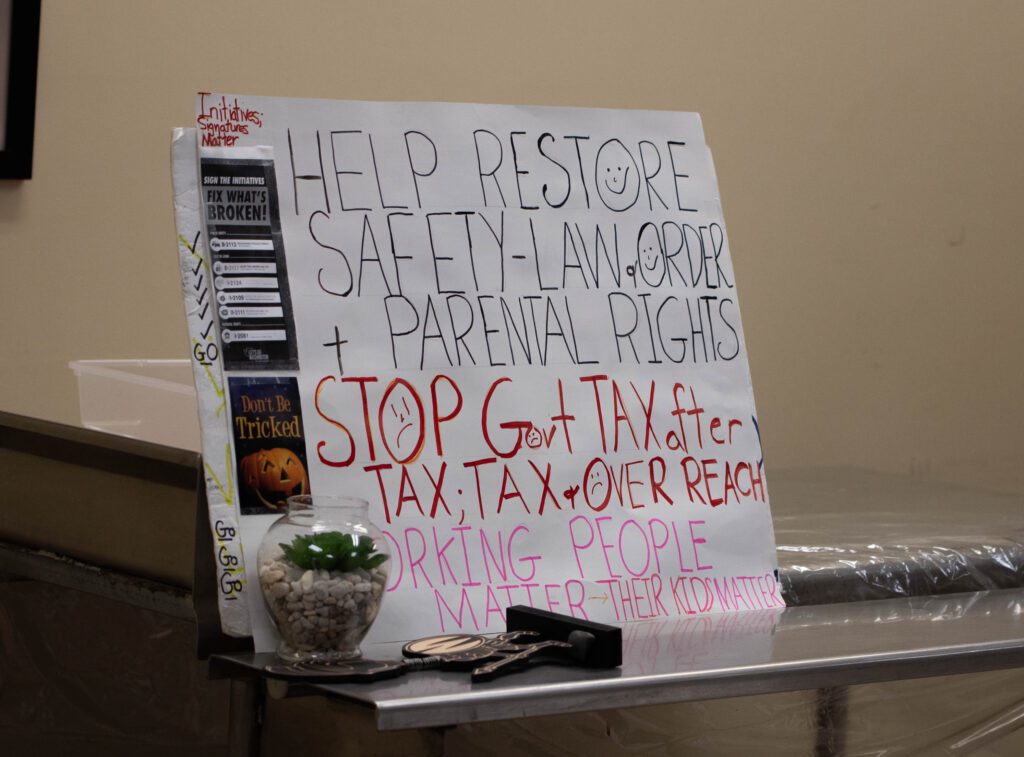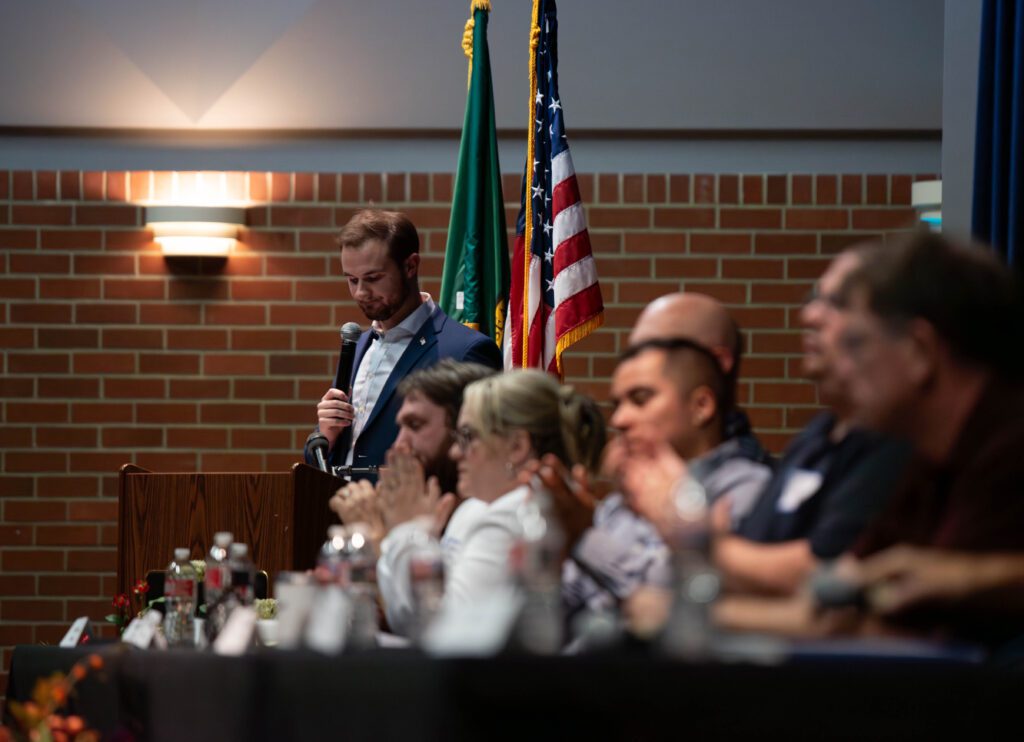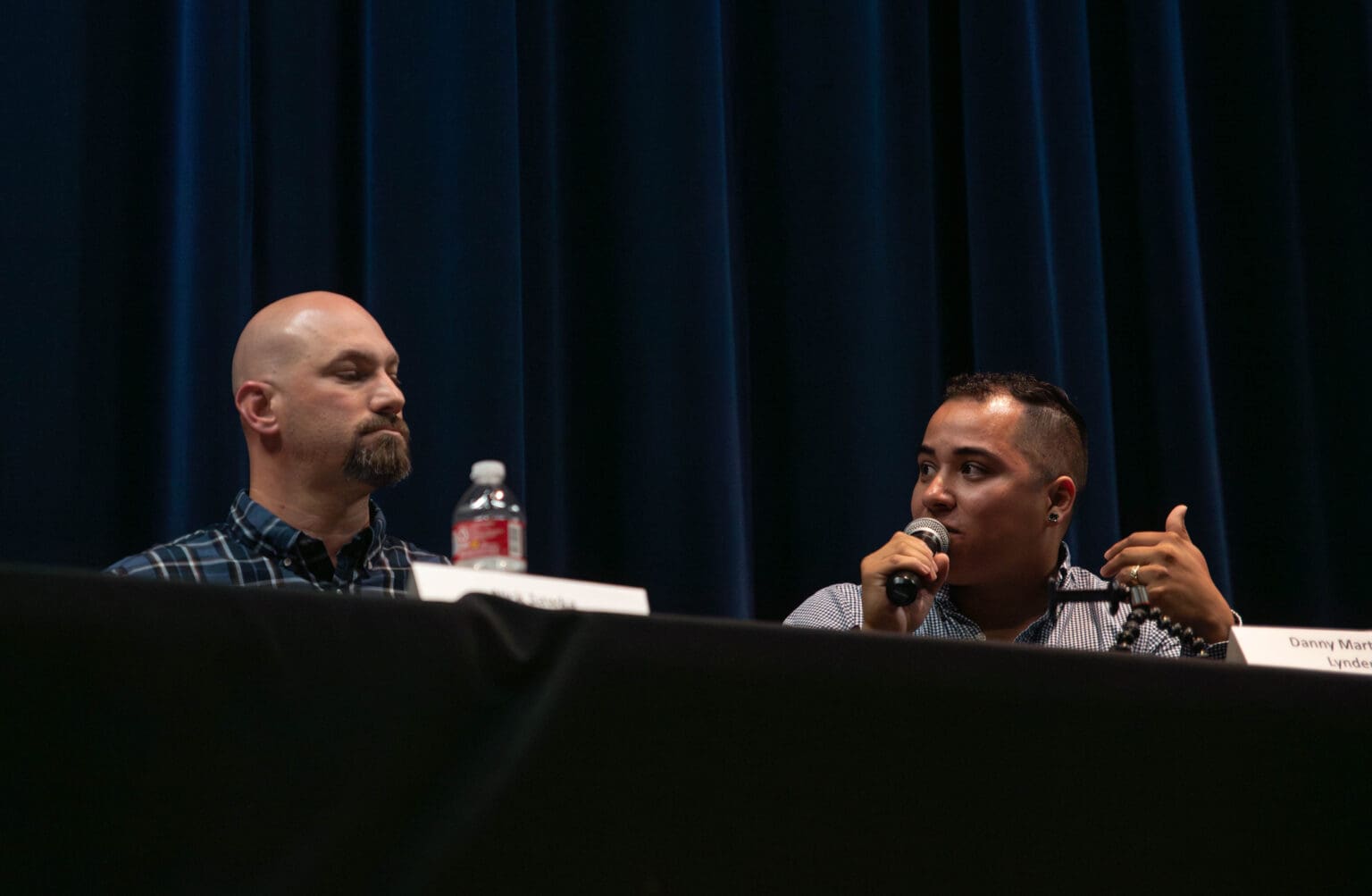From book bans to protests over critical race theory and sex education curricula, local school boards across the country have become heightened political battlegrounds.
While officially nonpartisan positions, Whatcom County’s open or contested board positions illustrate a greater political divide, as shown in recent candidate forums and interviews.
Between conversations about low academic performance post-pandemic and the need for upgraded facilities and balanced budgets, some candidates are demanding “parental rights” and discussing worries about “inappropriate curricula” and books in school libraries.
Some candidates have pushed back on those claims by opponents — accusing them of using scare tactics to bring up problems that don’t reflect reality. Others emphasize these positions need to be nonpartisan and avoid hot-button political topics.
Tim Garchow, executive director of the Washington State School Directors’ Association (WSSDA) confirmed the political shift in school board races statewide.
“The number of candidates who are openly identifying membership at one party or the other is a rather new thing,” he said. “We haven’t seen much of that in the past.”
Breaking down contested seats
Historically, school board elections in Whatcom County have not attracted much attention.
Looking back 10 years to 2013, all school board director positions were uncontested except one Bellingham Public Schools seat.
In November’s general election, nine Whatcom County school districts have director seats up for grabs. Out of 20 total seats in Lynden, Ferndale, Meridian and Blaine, 15 seats are up for election with 12 being contested.
It reflects a national trend; COVID-19 and its aftermath in the age of Trump-era political activism spurred involvement in school boards across the country.
School boards today are still discussing budget pressures and test score declines since the pandemic. With increased scrutiny, boards are also answering to vocal constituents concerned with parents’ rights regarding sexual education curricula, gender identity and critical race theory — described as a way of thinking about America’s history through the lens of systemic racism.
What rights do parents have in public education?
While school boards do have the ability to select curricula, the Washington state Legislature has laws mandating gender-inclusive schools and sex ed curricula.
“We have laws on the books and school districts need to follow those laws,” Garchow said. School board directors are able to advocate to legislators, but can’t change those laws from within the school board.
At a Sept. 21 forum at Meridian High School hosted by Common Threads Northwest, 18 county school board candidates turned the conversation to parental rights, often to raucous applause from the 50 or so attendees.
Lynden School Board Position 2 candidates Nick Sawka and Danny Martinez consider parental rights a centerpiece of their campaigns. Several candidates at the forum said parents need to be given more power to control what is taught — and what is not taught — in the classroom.
Parents and families do have rights in public education — bipartisan staff members of the Washington state Legislature Senate Education Committee put together a “Parents’ Bill of Rights” with more than 70 laws on the books that outline the rights parents and family members have in public education.
“It is not that parents do not have rights or that they’re losing rights,” Garchow said. “In fact, over the years, more and more laws granting parental rights have been established.”
Meridian School Board District 5 candidate Riley Sweeney said he thinks that when people talk about parents’ rights, they’re often saying they’re uncomfortable with what their kids are learning or experiencing in school.
“That’s fine for your kid, but you don’t get to decide that for everybody else’s kids,” said Sweeney, the former communications officer for the City of Ferndale.
Differing opinions on gender, sex education
At the Common Threads Northwest forum, which was advertised with a slogan, “Our kids, their schools, your choice,” Lynden School Board candidates Sawka and Martinez both spoke about concerns about gender identity, and transgender girls playing on girls sports teams, as did Meridian School Board District 5 candidate Michelle Simmons.
In an interview a few days after the forum, Sawka couldn’t reference any specific instances of transgender girls playing on girls teams in the Lynden School District, but said, “we will, because these situations are on the rise.”
Sawka also emphasized the importance of having “age-appropriate” books in school libraries. He referenced “All Boys Aren’t Blue” by journalist and activist George M. Johnson as an example of an inappropriate book, calling the series of essays about Johnson’s experience as a queer Black person “pornographic.” The book has been banned by school districts in Utah, Texas, South Carolina, Michigan and Florida.
Sawka said he doesn’t have concerns about any specific books in the Lynden School District libraries, but wants parents to know if they’re concerned, they could request a walkthrough of their school’s library to look for themselves.

The Meridian School Board District 5 race between Sweeney and Simmons is largely characterized by differing opinions on gender identity, sex ed curricula and critical race theory.
Simmons founded the Meridian Parent Coalition in 2020, and as a representative of the coalition, presented concerns to the Meridian School Board in July 2021 about “changes to restroom and locker room practices to include gender diverse students” and denounced critical race theory as an educational framework.
Sweeney was critical of Simmons in an interview and said that people are “getting whipped up by national political figures who use scare tactics to get people freaked out about what’s happening in our schools.” He said it doesn’t reflect reality in the Meridian School District.
Simmons said she wants to honor the “diverse community” in Meridian School District.
“If a family feels that a certain curriculum does not align with their beliefs, I do believe their voice and their concerns need to be heard and honored,” she said. “I don’t think that these kiddos are looking to be segregated as much as aligned in some kind of unity.”
Simmons said there have been situations “where parents wished they would have had more of a voice or impact,” but did not specify to Cascadia Daily News what they were.
“I know some situations are at the state level and not in our district yet, but could be happening here,” Simmons said.
Garchow said there are always examples of hot-button issues people can point to and say, “I don’t want that happening in my school system.”
“That’s OK. We understand that,” Garchow said, “but we need to be clear when we’re having discussions about things if somebody feels a law or a policy isn’t being followed, are we talking about solving a problem that exists in our district, or are we talking about trying to ensure that a problem that exists elsewhere doesn’t end up in our district? And there’s confusion sometimes over that.”
When asked about criticism that these concerns are coming from national political conversations, Lynden candidate Sawka said that’s the “typical deflection from the Democratic Party.”

Political or not?
While school board positions are nonpartisan, candidates are allowed to identify as a member of a political party, and any political party is able to endorse or contribute to school board races.
Sawka didn’t align himself with a party, but said to attendees at the Sept. 21 forum to “elect conservative school board candidates.”
Martinez, Sawka’s opponent, said he’s passionate about “ensuring our curriculum with conservative values” and said the classroom is “not a place for indoctrination coming from the far left.”
David Vis, incumbent District 3 candidate on the Lynden School Board, is adamant that school boards should be nonpartisan and said he is concerned about the political nature of the Lynden race.
“The national narrative of partisan divide is coming to school boards which have traditionally been nonpartisan positions,” Vis said. He said there’s what’s “actually happening at the school board, and a perception of what’s happening.”
Vis said some people would say COVID-19 “woke parents up,” but he said that to him, “it’s just divisive politics that are infiltrating a whole number of areas.” Vis’s opponent, Jim Verburg, did not respond to requests for an interview.
In the Meridian School District race, Simmons said she understands the position as nonpartisan and hopes every candidate is taking it as a nonpartisan role.
“We do not need children in the middle of politics, either side of an agenda,” she said.
Sweeney said he is not running to be a partisan candidate but wants to defend “our schools against the partisan influence that is being represented by [his] opponent.”
Garchow said disagreement on issues is good, as it allows school boards to produce better outcomes. But he said those disagreements need to happen in a civil, respectful manner.
“What we need to never lose sight of is that as school boards and superintendents and parents and family members and communities, we are the adults of the K-12 public education system and the children are watching.”



